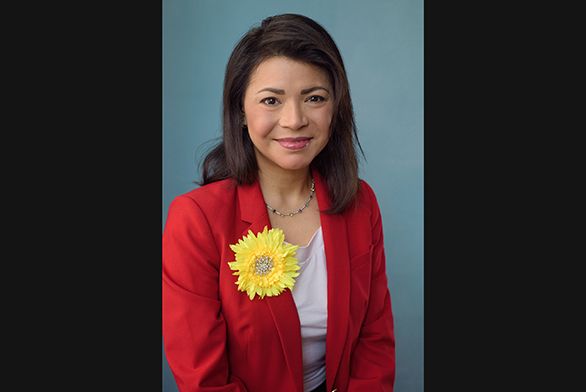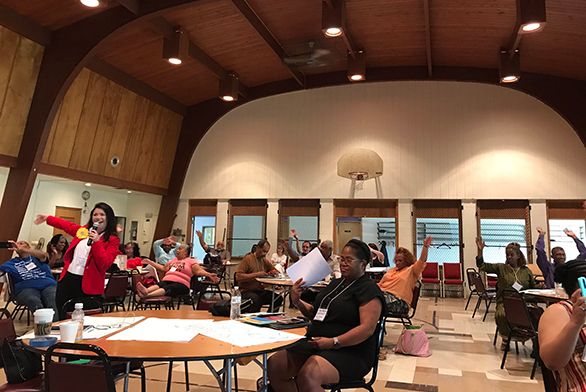Fighting for a Just Future: Following Up with Melanie Santiago-Mosier (A00)
September 8, 2020 | By Les Poling

A little more than a year ago, St. John’s profiled Annapolis alum Melanie Santiago-Mosier (A00), charting her journey from student at St. John’s to managing director of access and equity at Vote Solar, an organization devoted to providing affordable solar energy to all. Given the rising profile of legislation like the Green New Deal, the clean energy field has maintained a constant presence in the headlines in recent years. But Santiago-Mosier couldn’t have imagined, even in 2019, how searing and timely her work would feel now. As a summer of uprisings against racial injustice continues into the fall, people across the country are demanding an end to systemic racism in every industry—including energy.
In a recent piece co-written with Rosemary Lytle, NAACP Rocky Mountain president, Santiago-Mosier addressed the need to combat inequality in every facet of the industry: “For the sake of our energy, environmental, and climate justice future, the picture must include not only white men but women and people of color… we must all take a closer look at who’s being included—and who’s being left behind.” In conversation with St. John’s in August 2020, she elaborated on her point, referencing the changes implemented both at Vote Solar and her personal perspective.
Santiago-Mosier joined Vote Solar a little more than four years ago. At the time, the organization—whose stated mission is to achieve a 100 percent clean energy system in America via state-level advocacy—focused primarily on its low-income solar access program; a push for legislative and regulatory policy that expanded solar market opportunities for low-wealth communities. While the intentions were noble, Santiago-Mosier says, they weren’t encompassing enough. “In 2016, we had a narrow idea of what our work should look like: helping those with limited means go solar. It did not take us long to realize we needed to think more holistically.”
“Our energy system, like virtually every other system upon which this country was founded, has really been based upon racial injustice from the beginning,” she adds, noting studies that demonstrate the disproportionate consequences of pollution—heart disease, asthma, and more—experienced by Hispanic and African American communities. “There is a very clear through line from what our energy system has looked like for the last 100 years to the environmental injustices that have largely been wrought on communities of color in this country.”
Santiago-Mosier and the rest of the Vote Solar team quickly realized that they couldn’t limit the scope of their clean energy undertaking; that there needed to be a broader push for equity and justice in each step of the advocacy process. That meant rejecting the savior mentality that can often pervade nonprofit work; partnering with communities on the frontlines of energy and environmental injustice; and making sure members of those communities had an equal say in planning their clean energy futures.

Shifting organizational focus and working to democratize clean energy are not easy tasks. To begin working on those projects in earnest, Vote Solar had to change both internal and external practices. “If we’re going to be out in the world, professing to be an organization that is working on equity and justice, we need to be doing that internally as well,” Santiago-Mosier says. To that end, she has begun leading efforts to refine recruitment and hiring practices to ensure equal representation; developing internal workshops to build skills and training that pertain to equity, diversity, and inclusion; and, most importantly, creating a working group to cultivate core competencies to guide the organization in the future and answer the question: “What does it mean to be an organization that is equitable and just?”
“Those core competencies will help us narrow down and define, concretely, what [an equitable and just organization] looks like,” says Santiago-Mosier, who recently enrolled in a certificate program in diversity, equity, and inclusion at Cornell University. “We are working on ourselves as an organization and making sure we’re creating a culture that is welcoming to people across all backgrounds.”
Externally, Vote Solar has started partnering more closely with frontline communities and working on those communities’ schedules. Instead of swooping in to try and “rescue” people impacted by pollution, Vote Solar shifted its focus towards building coalitions that prioritize community voices. That included hiring an additional team member who works with Santiago-Mosier on outreach, making sure that listening and equity are the cornerstones of every Vote Solar project. Now, the organization strives to ensure that every element of any given Vote Solar campaign—from identifying potentially important legislation or regulatory guidelines, to community engagement and outreach, to marketing and messaging, to the eventual passage of a bill or utility policy—happens in coordination with the communities that stand to benefit.
“It takes time to build relationships. It takes time to build trust with groups of people who are dealing with any number of different issues and crises at any given moment,” Santiago-Mosier notes. “We often know that we're not a priority for them. But at the end of the day, we've been successful when we put in the time to build those relationships and get that input from our community partners. And that results in a much stronger campaign.”
In addition to building equitable partnerships with frontline communities, Santiago-Mosier’s new Vote Solar staffer, Lavannya Pulluveetil Barrera, runs workshops and capacity-building trainings to help interested groups develop the skills and resources needed to transition to clean energy. Another new member of the team, Olivia Nedd, is looking to create strategies for workforce development in the future—another potential facet of Vote Solar’s quest for an equitable clean energy system.
Pointing to intensifying climate catastrophes like Hurricane Laura and the lingering historical injustices of the United States, many clean energy advocates believe radical change in the domestic energy industry is more necessary than ever. But like other such struggles, Santiago-Mosier explains, the powers that be present plenty of obstructions to communities hoping to breach the clean energy threshold. “One of the challenges is financing,” she says. “We’re talking about communities that have been disadvantaged for a long time, and really don’t have a lot of access to wealth. So breaking down that barrier of access to capital is a big challenge.” Additionally, she points to the lack of technical capacity and training when it comes to solar energy across the country. Most importantly, she says, “Communities of color and other communities on the frontlines of energy injustice have very purposely been excluded from the public conversation. There really has to be a reworking of our public decision-making processes to make sure that those voices are no longer excluded and, in fact, are sought after and prioritized.”
Santiago-Mosier finds hope in the fact that there are real-world victories to celebrate, communities working on clean energy projects across the country. As an example, she points to the Sunset Park Solar project in Brooklyn, New York—a community solar system owned and operated by a cooperative of local residents and businesses. She also references one of the organizations involved in Sunset Park Solar, a local environmental justice nonprofit called UPROSE. “They’re building a community solar array on top of the Navy terminal in Brooklyn,” Santiago-Mosier says. “That array is community owned, operated, and managed, and the people who are benefitting from that solar array are community members who are saving 15 percent on their electricity bills and generating wealth for their community.”
For Santiago-Mosier, the 100 percent clean energy future that Vote Solar is striving for looks very similar to projects like Sunset Park Solar, but on a mass scale. She describes our current, fossil fuel-driven economy as “extractive,” in terms of both natural and human resources: the pollution that occurs, the jobs that evaporate, the health issues that arise. A fair, clean energy economy, she suggests, would be the exact opposite: regenerative. Not just as it pertains to reducing pollution and saving money on energy bills, but for creating sustainable economic and health benefits that stay local. “Many of our frontline partners envision localized clean energy facilities that are community owned, community managed, and are building wealth and jobs,” Santiago-Mosier explains. “Solar can actually be a tool that helps to create that regenerative, clean energy-based economy for communities that desperately need it.”
Fighting for state-level clean energy policies can sometimes feel like a thankless job. But in the summer of 2020, The Daily Record recognized Santiago-Mosier as one of Maryland’s Top 100 Women, an acknowledgement of “outstanding achievements of women through professional accomplishments, community leadership, and mentoring.” It’s an honor she’s beyond grateful to receive; she values the three traits named by the Record immensely. Ultimately, though, the award is more important to Santiago-Mosier as a recognition of Vote Solar’s mission, and she hopes to use her platform to expand the fight for energy equality. As she wrote for the NAACP:
“Renewable energy is a revolution that embodies radical, fresh, and innovative approaches to the way we power our country. Let’s do away with practices that keep industries tied to past inequities. Let’s transition to a clean energy economy that truly represents everyone it hopes to serve.”

